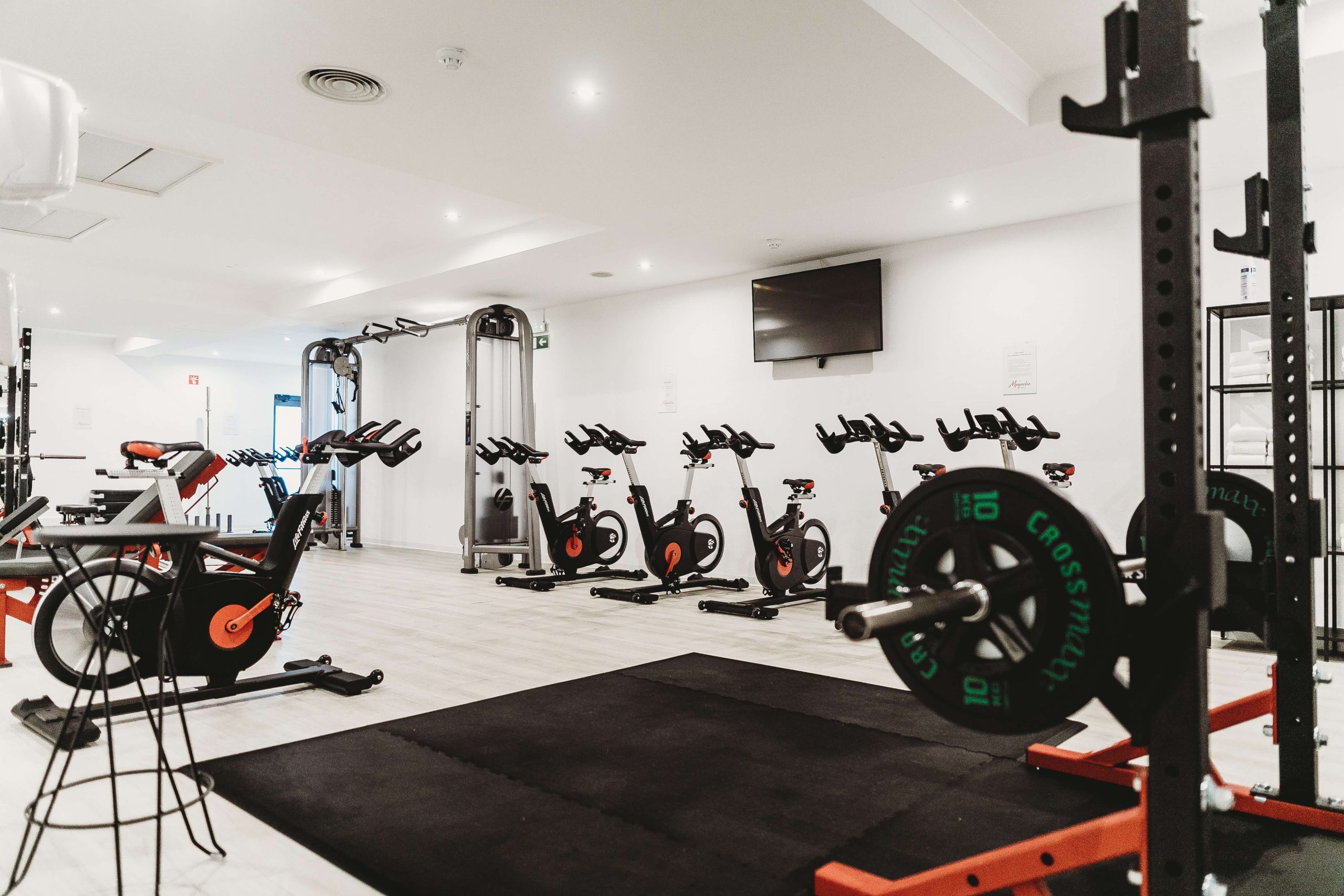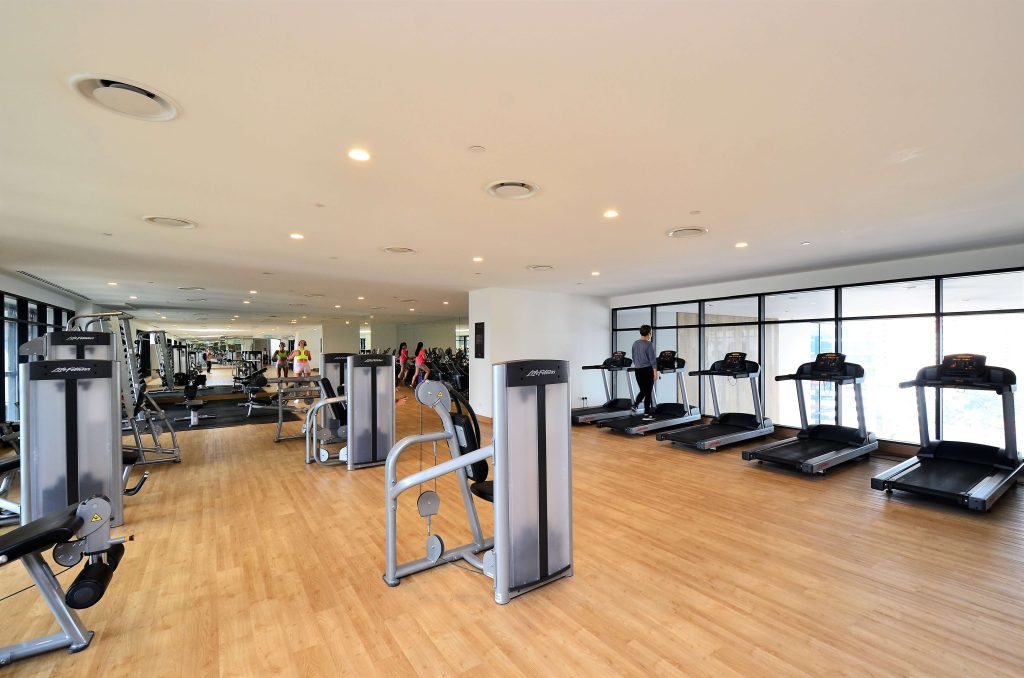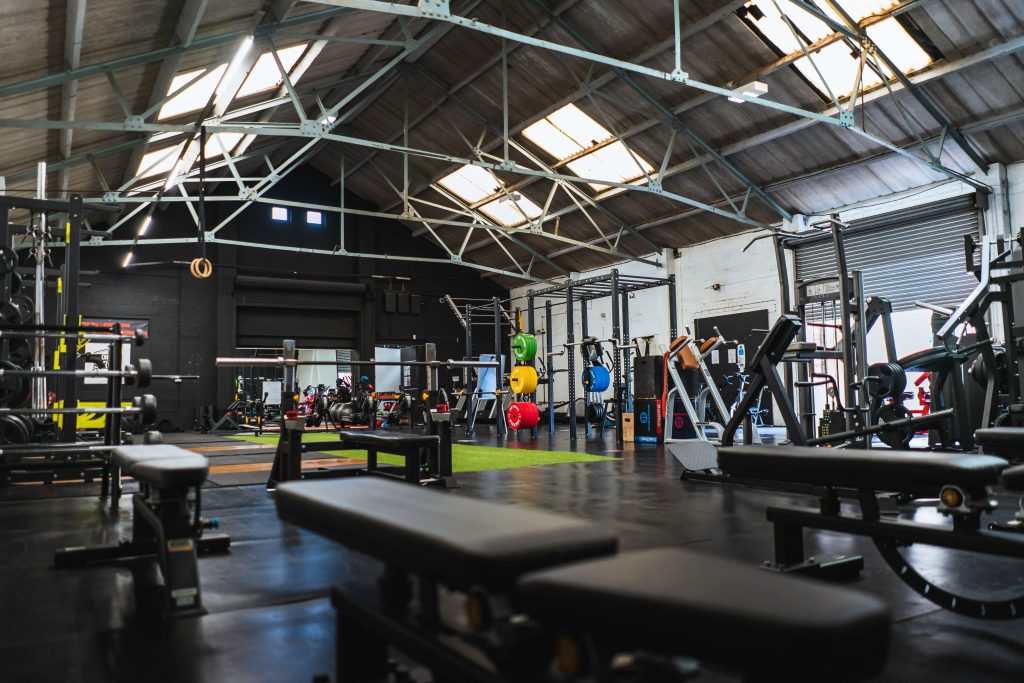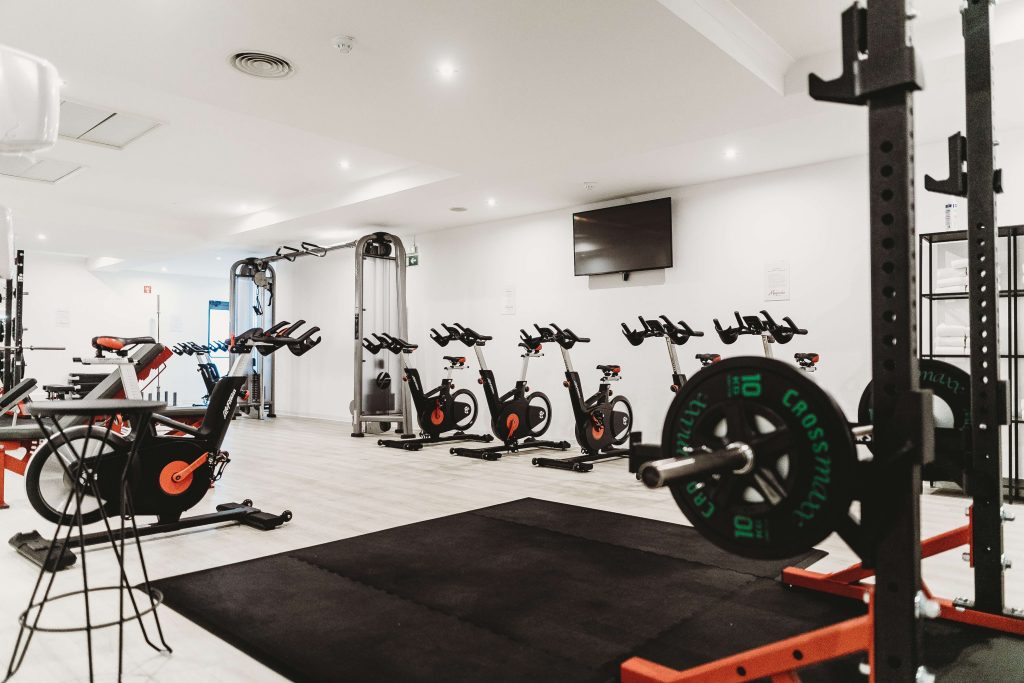If you’re interested in opening a gym or fitness franchise in the UK, it’s important to understand the costs involved, including gym franchise fees, start-up investments, and running costs. Starting a fitness franchise can be an effective way to make an annual return, but investors must be aware of the various costs and fees of taking on a gym franchise.
What does it cost to open
a gym franchise in the UK?
The total cost to open a fitness franchise in the UK depends on the franchise you work with and the level of investment you choose to make. At the cheapest end are fitness franchises like Train Learn Go, which offers investors the chance to run their own mobile personal training business for as little as £5000 plus ongoing fees.
Opening your own fitness centre or gym is considerably more expensive than this because you’ll have to pay for the cost of building, fitting out, and equipping your gym. In total, including gym franchise fees and investment into your gym, you could be paying around £300,000 to £500,000 on average to fund a gym franchise.
At the upper end of the market, specialist gyms can cost even more than this. The minimum investment for a Gold’s Gym is £852,000 while the minimum investment to open a Gravity Trampoline Park is around £1.2 million. This is because you’ll have to pay for more specialist equipment to fit out gyms in this category, as well as paying higher ongoing costs.
By contrast, opening a Hitsona fitness studio franchise costs from £20 000 up to £60 000, with a significantly faster break-even point than most other gym and finesses franchises in the UK.
A step-by-step list of each start-up cost to open a
gym franchise in the UK
If you want to open a fitness franchise in the UK, you’ll have to be prepared to pay gym franchise fees as well as equipment costs and other expenses. Let’s take a look at the cost to open a gym franchise in the UK and what you’ll have to pay at different points in the process.
1. Gym franchise start-up fees
The first cost to open a fitness franchise in the UK is the gym franchise startup fee that you’ll pay to the franchisor when you sign your franchise agreement. This fitness franchise price usually buys your right to use the franchise brand in your signage and marketing materials, as well as covering the cost of administration, training, and other support you’ll receive from the franchisor.
Fitness franchise fees can range between franchisors. Anytime Fitness charge investors a franchise fee of £39,000 while Hybrid Fitness charge franchise fees of £20,000 and Jetts Gym charge investors £29,500. At the lower end of the spectrum, Train Learn Go only charge a minimum franchise fee of £5000.
The fitness franchise fees that you’ll pay are determined by a number of factors, including the strength and value of the brand that you’re partnering up with, and the cost to the franchisor of onboarding you.
Higher gym franchise fees may indicate that you’re buying into a high-value brand or that the franchisor is offering you more support and tools in exchange for your fees. However, it’s always important to ask what your franchise fees get you before you sign your gym franchise agreement.
2. Premises
Another significant gym franchise cost in the UK is rent. After you’ve paid the fitness franchise price to your franchisor, you’ll work together with your franchisor to select a suitable location for your new fitness franchise. Once you’ve chosen a location, you’ll need to find premises to rent. A good rule of thumb is usually that you’ll need 10-15 square feet per person, which means you’ll need 1,000 square feet of gym space for every 100 monthly members.
When you’re looking for premises for your gym, take into consideration what you’ll need to make space for. Do you need room for a café or seating area, and is your gym in a location where a car park is important? Do you need to incorporate an office space for administration work, and how much space do you need to allocate for lockers, showers, and changing?
The cost to rent gym space in the UK depends on where you’re looking at opening a gym or fitness franchise.
Commercial rental rates will be higher in the south, and premises in city centres and affluent towns will be more expensive than in suburban locations. The cost range can be anything from £1,000 to £3,000 per month on average, exceeding this in premium locations like Central London.
3. Gym equipment
After you’ve chosen your gym premises, the next significant franchise cost you’ll incur in the start-up process is purchasing or leasing equipment for your gym.
Depending on the type of gym or fitness studio franchise you’re starting, you may need to purchase treadmills, exercise bikes, weights, rowing machines, kettlebells, and benches. Specific costs vary between franchises, with some franchises requiring that franchisees spend much more on gym equipment than others.
If you choose to open a Gold’s Gym, for example, you may have to pay between £80,000 and £320,000 for specialist gym equipment and free weights. You won’t be able to bring your costs much lower than this because the Gold’s Gym franchise agreement will outline what equipment you must provide in your gym and which brands you may stock.
At the lower end of the spectrum, Train Learn Go supplies all the fitness and training equipment that their franchisees use for the initial franchise fee. On average, though, you will likely have to spend between £20,000 and £60,000 on equipment for your gym or fitness centre.
What are the operating costs involved in running
a gym or fitness franchise in the UK?
Once you’ve launched your gym or fitness centre, you’ll have to pay ongoing franchisee costs to run and manage your gym on a monthly or annual basis. These costs significantly contribute to the average gym franchise price.
1. Ongoing franchise fees
Most fitness franchises will charge their franchisees ongoing fees monthly or annually. Often, these fees are set as a proportion of gross revenue. In some cases, the gym franchisor may require that franchisees pay a fixed amount, or whichever is higher between a fixed amount and a percentage of revenue.
Franchise fees vary significantly between franchises, although most gym and fitness franchises will charge a management fee of 6-10% as well as a marketing fee of 1-3%. Some gym franchises may also charge one-off additional fees such as a fixed fee to train new members of staff or a fee to register for franchise conventions.
Some examples of gym franchise fees are:
- Anytime Fitness: £550 per month + £500 per month advertising feesGold’s Gym: 5% gross revenue + 2% gross revenue for marketing
- Snap Fitness: 6% of gross revenue + 2-4% of gross revenue for marketing
- Curves: 7.5% of gross revenue + 2% marketing fees
Some of these franchises, including Gold’s Gym and Curves, also include a minimum royalty and marketing fee that franchisees will have to pay regardless of revenue.
2. Gym staff wages and labour
As the owner of a gym franchise, you’ll have to hire staff to work in your fitness facility and pay their monthly wages. You may need to hire fitness instructors, personal trainers, cleaning staff, baristas, receptionists, and administrators.
As well as paying your staff wages, you may also have to contribute towards pensions, sick pay, holiday pay, and other perks.
The staff needs of your gym will depend on the size of your gym and your operating hours, but it’s important to calculate staff expenses before trying to estimate your future profit margins.
Some examples of average salaries for gym staff in the UK include:
- Gym instructor: £24,893
- Personal trainer: £28,852
- Gym supervisor: £28,329
- Fitness equipment technician: £40,361
High-end gyms like Hybrid Fitness and Gold’s Gym usually have higher staff labour costs because you’ll be expected to pay more specialist instructors and personal trainers, whereas budget gyms like PureGym and truGym offer fewer services to members that might incur additional costs.
3. Ground rent and utilities
Every month, you’ll have to pay ground rent and utility bills to power and heat your gym. You might also face a relatively high water bill. These fees will likely be affected more by the size and capacity of your gym than by the specific franchise brand you choose to work with, but nevertheless, it’s important to factor them into the cost to open a fitness franchise in the UK.
We’ve already mentioned that the average gym premises rental cost is around £1000 to £3000 per month, with some premises reaching £5000. Add average utility bills of around £2000 per month to this to cover water, heating, and power.
4. Product costs
An extra gym franchise cost in the UK is the cost of products and amenities that your gym sells. Many fitness franchisors will require their franchisees to stock and sell branded products and amenities including snacks, protein supplements, towels, drinks bottles, apparel, and other products.
As a gym franchisee, you will have to budget the cost of purchasing this stock into your annual running costs, although hopefully, you’ll make a profit from the sales of these items.
5. Renewal costs
It’s important to consider the cost of renewing your franchise agreement when calculating the total cost to start up a gym franchise in the UK. Most gym and fitness franchises will charge franchisees a fixed fee to renew their agreement at the end of the initial term, so always check how long your franchise term is and how much it will cost to renew the agreement at the end of this term.
Most fitness franchise agreements last for between five and ten years, with the cost to renew usually being less than the initial franchise fee, sometimes around 50%.
6. Insurance
You’ll also have to pay to have your fitness centre or gym insured. This will include public liability insurance and employers’ liability insurance, and you may also need buildings and contents insurance. These are important costs but shouldn’t add up too much: the average public liability insurance premium is only £119 per year.
The cost of opening a fitness franchise by brand
The biggest determining factor of the cost to open a fitness franchise in the UK is the franchise that you decide to work with. The cost can range massively between gym franchises, with some franchisors asking their franchisees to spend hundreds of thousands of pounds more than other franchisors.
Below is a breakdown of the minimum investment required for some of the biggest fitness franchises in the UK:
- 9Round Fitness: £60,000
- Curves: £37,500
- easyGym: £300,000
- Gold’s Gym: £852,382
- Hitsona: £20,000 – £50,000
- Snap Fitness: £125,000
- Hybrid Fitness: £50,000
- Anytime Fitness: £170,000
- TruGym: £25,000
Conclusion: what is the cost to open a fitness franchise in the UK?
The total cost to start a fitness franchise in the UK involves start-up fees, initial investment, building, and marketing costs, and extends to ongoing costs including royalty fees, rent, and gym staff wages.
The initial cost to open a fitness franchise in the UK varies massively between franchises, and the gym franchise price of a particular group will depend on the cost of the equipment, the strength of the brand, and the size and scope of standard gyms within that franchise.
The cost to start a fitness franchise in the UK can be tailored to suit your budget, with franchises like Train Learn Go offering extremely low startup fees and others, like Anytime Fitness and Gold’s Gym, requiring more investment from day one.
It’s also important that all franchise investors understand the ongoing costs associated with running a fitness franchise and their obligation to continue paying them for the full term of their gym franchise agreement.
FAQs
If you want to know more about the average fitness franchise cost or the cost to start up a gym franchise in the UK, read some of our most frequently asked questions below.
1. Can I get help with the cost to open a fitness franchise in the UK?
Yes, you can secure third-party funding from high-street banks and other lenders if you want to, although some franchisors may limit the proportion of your funds that can come from loans, for example requiring that you put up at least 30% of the total investment value yourself.
Some fitness franchisors will even help to put you in touch with investors and banks who could help you to finance your franchise.
2. Is there a minimum net worth to be eligible to start a fitness franchise?
Yes, a lot of fitness franchises will require that franchisees have a minimum net worth and/or a minimum liquid capital in order to ensure that they can cover the cost to start a fitness franchise in the UK.
These requirements vary between franchisors:
- PureGym: £1.6 million net worth
- Gold’s Gym: £769,000 net worth
- Anytime Fitness: £280,000 net worth
- Curves: £60,000 net worth
The minimum net worth that franchisors require doesn’t always align perfectly with the total fitness franchise cost for their UK brand. It’s always worth discussing your personal financial situation with the franchisor to find out whether they’d consider partnering with you.
3. Can I negotiate the terms of my gym franchise agreement with my franchisor?
If you want to reduce the cost to open a gym franchise in the UK, you might try to negotiate your franchise agreement during the early stages of discussions. While it’s technically possible to do this, in most cases franchisors will only offer you their standard franchise agreement.
4. Are there any potential or hidden costs to be aware of when opening a fitness franchise?
There can be, which is why it’s important to check with your franchisor and make sure that you’re aware of all of the costs involved in your agreement before you sign to become a franchisee. Different franchises will charge very different fees, and some franchisors might bundle training and equipment with your franchisee fees while others will charge you separately for these.









